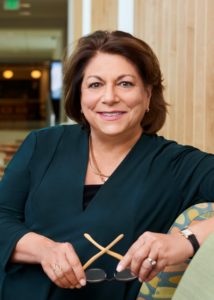
Editor’s note: The following is an edited version of remarks that CSU President Joyce McConnell gave in an address on March 15, International Women’s Day, to the International Council of Small Business. The full address is available online. A second address that she delivered on March 19 to the American Association of University Women, “The future of (women’s) work: How and why we must support women in the post-pandemic university,” is also available online.
As we celebrate Women’s History Month, I’ve been reflecting on the courage required to be a woman and a leader. I’ve also been thinking about the extraordinary women of Colorado State University.
This led me to stories of some incredible women, stories I believe will inspire others to approach their journeys with courage.
Several weeks ago, we lost one such woman, Mary Ontiveros. She retired in 2020 and died earlier this year.
Mary was part of the CSU community for an amazing 51 years, initially as a first-generation Latina undergraduate in 1969. As our founding vice president for diversity, Mary created scholarships for first-generation students and developed a diversity blueprint that called on every academic college to create a role in their unit entirely focused on diversity, equity, inclusion, and justice.
Mary’s legacy demonstrates that women build their work to last. Everything she built at CSU remains an active engine for positive change.
And Mary’s story leads us to Lumina Albert, currently an associate professor of management in our College of Business. An internationally respected activist and advocate for ending human trafficking, Lumina organizes an annual symposium focused on eradicating this abhorrent practice and serves on the Board of Directors of New Horizons House, an international organization providing holistic restoration for survivors of human trafficking and sexual abuse.
This past year, in the midst of the pandemic, Lumina launched CSU’s Center for Ethics and Human Rights. This interdisciplinary center “aims to transform individuals and communities through strategic partnerships and collaborative programs that inspire ethical leadership and protect and promote human rights and dignity worldwide.”
Mary Ontiveros, Lumina Albert, and CSU women across generations have exhibited tremendous persistence and courage to make a positive impact on our world. The next generation will be our students, the leaders of tomorrow.
Savanah Overturf is one of them. She has autism, schizophrenia, and epilepsy and was nonverbal until she was 4 years old.
Now Savannah is pursuing a CSU degree in communication studies with a minor in creative writing. Last fall, she was crowned National Miss Amazing in a pageant that highlights women and girls with unique abilities and teaches leadership and advocacy skills. Savannah’s own description of this event is even more eloquent: She says Miss Amazing is “about creating social change and changing the way people look at those with unique abilities. It gives us a unique platform to create a change we want to see in the world.”
Savannah has built her own model of advocacy and activism, sought the skills she needs through her education, and by sharing her story publicly. I anticipate that hers is a model we will see often as this generation of young women realize their potential, the value of their voices, and the strength of their courage.
Courage is one of the essential qualities of CSU, so much so that we’re calling the blueprint for our future Courageous Strategic Transformation. This new vision for our institution is nothing like traditional strategic planning. It is distinguished by many of the characteristics and qualities of female leadership.
The plan took shape through months of intense collaboration across our university community. We sought input from students, faculty, staff, alumni, and donors. And instead of declaring inclusive excellence as one value and one goal amongst many, we asserted it as foundational to our future, a powerful aspiration that, together, we will weave into all our work.
I invite you all to pursue transformation in your own lives and to ask yourselves how you — as women, as leaders, and as women leaders — can effect transformation in our world. The world needs us, as it has throughout the years, and now is our time to shine. I am so excited about what we all have to offer.